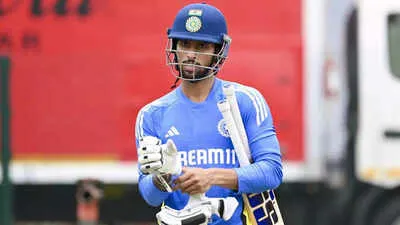
Tilak Varma has pulled out of the Duleep Trophy semifinal for South Zone to focus on preparations for India’s Asia Cup campaign—a clear signal of his rising stock in Indian cricket. Initially named as captain of the South Zone squad, Varma’s inclusion in the Asia Cup team forced a reshuffle that will have ripple effects on both domestic and international fronts.
In his absence, wicketkeeper-batter Mohammed Azharuddeen has been elevated from vice-captain to lead the South Zone side. Tamil Nadu’s prolific run-scorer Narayan Jagadeesan has stepped up as the new deputy, giving the team an experienced leadership group despite Varma’s withdrawal.
To reinforce the squad, selectors drafted in Puducherry allrounder Ankit Sharma and 20-year-old Andhra Pradesh batter Shaik Rasheed. Rasheed, who has been steadily climbing the domestic ranks, adds youthful flair and promise to the batting order. His strong Ranji Trophy season and IPL experience with Chennai Super Kings make him a player to watch in this reshaped unit.
The timing of Varma’s pullout highlights the delicate balance between domestic tournaments and international duty. The Asia Cup, beginning September 9, is a marquee event where India will test its best talents ahead of the ICC Champions Trophy and next year’s World Cup cycle. By skipping the Duleep Trophy, Varma avoids the risks of overexertion, injury, or travel fatigue—ensuring he arrives fresh and focused for India’s continental challenge.
For the South Zone team, however, the sudden leadership shuffle could be disruptive. Varma’s absence not only deprives them of a dependable top-order batter but also a young leader with composure under pressure. Azharuddeen now faces the dual task of managing expectations and ensuring the squad adapts quickly to new roles. Jagadeesan’s promotion to vice-captain brings stability, but it is clear that South Zone must adjust tactics without their original skipper.
From a broader lens, this decision underscores how the Indian cricket ecosystem has evolved. With the Asia Cup acting as both a standalone prize and a testing ground for future ICC tournaments, selectors prioritize national duty over domestic competitions. At the same time, this offers opportunities for players like Rasheed and Sharma to prove themselves on a bigger stage. If they perform well in the high-stakes semifinal, their careers could take a significant leap forward.
For Tilak Varma, the withdrawal is a pragmatic career move. At just 21, he is viewed as a long-term investment for India’s middle order across formats. His aggressive yet composed batting style has already drawn comparisons with some of India’s modern greats. Protecting his form and fitness ahead of the Asia Cup ensures he remains in contention for bigger assignments in the months ahead.
In essence, Varma’s exit from the Duleep Trophy isn’t a setback but a strategic shift. It allows India to safeguard one of its brightest prospects while giving other domestic players a chance to shoulder responsibility. The semifinal now carries added intrigue—not just for the result, but for the stories of those thrust into the spotlight in his absence.
12BET Shortlisted for Sportsbook Operator of the Year at SBC Awards 2025

